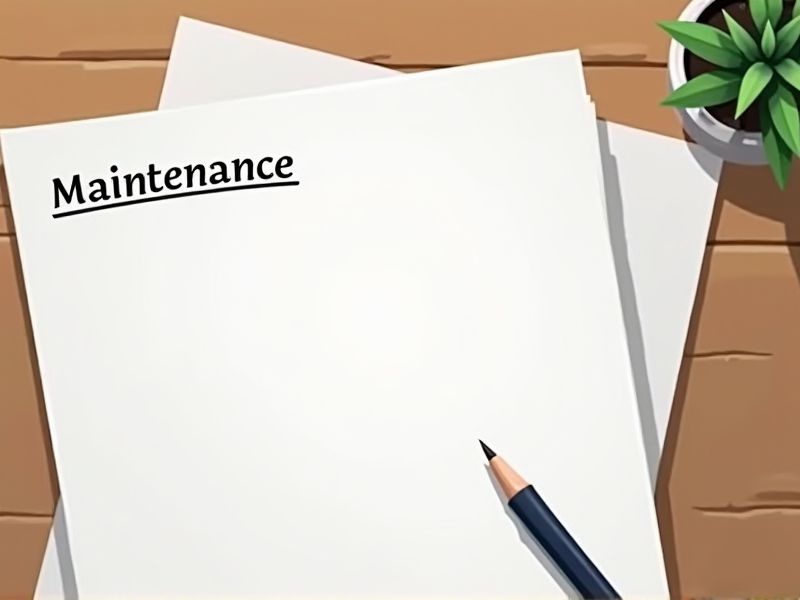
Maintenance managers play a crucial role in ensuring the smooth operation of equipment and facilities. Certifications validate their expertise and enhance their ability to manage complex systems efficiently. This formal recognition not only increases their credibility but also provides them with the latest industry-standard practices. Here are some important certifications you may need as a Maintenance Manager.
Certified Maintenance & Reliability Professional (CMRP)
Certified Maintenance & Reliability Professional (CMRP) certification equips maintenance managers with advanced skills in reliability and maintenance best practices, leading to improved asset management. This certification often results in increased operational efficiency by reducing downtime through effective maintenance strategies. Possessing a CMRP enhances a manager's credibility within the industry, promoting trust and recognition from peers and leadership. Many organizations seek professionals with CMRP credentials to ensure consistent implementation of industry standards, thereby maintaining competitive advantage.
Certified Maintenance and Reliability Technician (CMRT)
Maintenance Managers need CMRT-certified technicians because they provide validated skills and knowledge, leading to increased operational efficiency. Certified technicians reduce unexpected equipment downtime, ensuring production schedules remain consistent. Their expertise in preventive maintenance contributes to extending equipment longevity, minimizing costly repairs. By having CMRT-certified team members, Maintenance Managers improve compliance with industry standards, enhancing overall safety.
Certified Facilities Manager (CFM)
Certified Facilities Managers bring structured methodologies to maintenance management, enhancing efficiency through standardized practices. Their training helps in implementing cost-effective maintenance strategies, reducing downtime and increasing asset longevity. With certification, they are equipped to address regulatory compliance and sustainability mandates, mitigating potential legal and environmental risks. CFMs possess the skills to assess and optimize facility operations, leading to improved overall facility performance.
Certified Reliability Engineer (CRE)
A Certified Reliability Engineer (CRE) brings expertise in identifying the underlying causes of equipment failures, which enhances the decision-making process for a Maintenance Manager. Proficiency in reliability engineering techniques helps forecast potential downtime, thereby optimizing maintenance schedules and resource allocation. CREs utilize data-driven methods to extend the lifecycle of assets, reducing costs and improving asset utilization. The advanced analytical skills of a CRE facilitate the implementation of preventive and predictive maintenance strategies, leading to improved operational efficiency.
OSHA 30-Hour Safety Certification
The OSHA 30-Hour Safety Certification equips maintenance managers with extensive knowledge of occupational safety standards, which ensures a safer work environment. It leads to a reduction in workplace accidents and safety violations, directly impacting the organization's operational efficiency. Enhanced understanding of regulations can result in decreased legal liabilities and associated costs for the company. Improved safety protocols foster employee confidence, potentially boosting overall productivity and morale.
Lean Six Sigma Green Belt Certification
Lean Six Sigma Green Belt Certification equips maintenance managers with skills to identify and eliminate waste, enhancing operational efficiency. With these skills, maintenance processes become more streamlined, reducing downtime and improving equipment reliability. The structured problem-solving approach inherent in Lean Six Sigma enables managers to implement data-driven strategies, minimizing errors and maximizing productivity. Possessing a Green Belt Certification helps maintenance managers to lead and coach teams effectively, fostering a culture of continuous improvement.
Project Management Professional (PMP)
A PMP certification equips a Maintenance Manager with advanced project management skills, enhancing efficiency in planning and executing maintenance tasks. With structured methodologies from PMP, the manager can better align maintenance projects with organizational goals, minimizing downtime and resource waste. The certification also provides a recognized proof of competence, which can enhance credibility and trust in the manager's ability to handle complex projects. Effective risk management strategies learned through PMP can significantly reduce unexpected maintenance issues, leading to smoother operations.
Certified Energy Manager (CEM)
A Certified Energy Manager (CEM) is crucial for a Maintenance Manager because their expertise directly improves energy efficiency within facilities. The specialized knowledge of CEMs enables the identification of energy-saving opportunities, reducing operational costs significantly. CEMs possess the skills to conduct energy audits, which reveal inefficiencies and offer actionable strategies for rectification. Their involvement ensures compliance with energy regulations and contributes to sustainability goals, enhancing the facility's overall performance.
Facilities Management Professional (FMP)
The presence of a Facilities Management Professional (FMP) elevates the efficiency of a maintenance manager by introducing best practices and strategic oversight. With their expertise, FMPs ensure that equipment and infrastructure are serviced timely, thereby reducing downtime and related costs. They bring knowledge of sustainable management, impacting energy savings and environmental responsibility. FMPs also bridge communication across departments, enhancing coordination and project completion rates.
Maintenance Planning and Scheduling Professional (MPSP)
Maintenance Planning and Scheduling Professionals (MPSPs) improve overall efficiency by systematically organizing maintenance tasks, which reduces machine downtime. Effective planning leads to optimized resource allocation, ensuring that both manpower and materials are used efficiently. This strategic approach enhances asset reliability, limiting unexpected failures and extending equipment lifespan. Better scheduling by MPSPs helps in reducing maintenance costs while maximizing operational productivity.
Summary
You can expect enhanced skills and knowledge from a certified Maintenance Manager, leading to improved maintenance protocols. Their expertise often results in increased equipment reliability and reduced downtime. Organizations may experience cost savings due to more efficient resource management. Certification can bolster team morale, encouraging standardized practices and continuous improvement.
